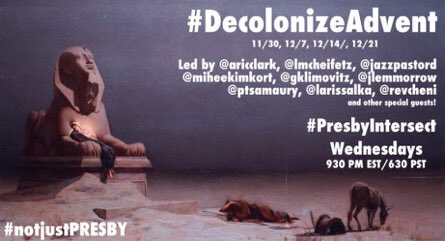Rethinking church 140 characters at a time
by Sue Washburn | Presbyterians Today
When it comes to conversations about church, most of us imagine sitting around a table and engaging face-to-face. Maybe it’s in a church basement, conference center, coffee shop, or a local bar. But lately Presbyterians have been gathering for a weekly conversation around their phones or computers, using Twitter and a common hashtag. These online conversations can take place on a couch at home while kids are playing, at a computer on a desk at work, or on a smartphone while waiting in line at the grocery store.
 #PresbyIntersect, a weekly Twitter chat, gathers conversation partners from around the country to talk about church, faith, and social issues. #PresbyIntersect chats are held each Wednesday starting at 9:30 p.m. EST. They are organized and led by a small group of passionate Presbyterians from a variety of churches who are active on social media. The discussions are focused on a particular topic and moderated by one or two people. Each discussion unfolds like many discussions do. A question gets asked and people respond with their thoughts and questions of their own.
#PresbyIntersect, a weekly Twitter chat, gathers conversation partners from around the country to talk about church, faith, and social issues. #PresbyIntersect chats are held each Wednesday starting at 9:30 p.m. EST. They are organized and led by a small group of passionate Presbyterians from a variety of churches who are active on social media. The discussions are focused on a particular topic and moderated by one or two people. Each discussion unfolds like many discussions do. A question gets asked and people respond with their thoughts and questions of their own.
“The desire is to have topics that address the intersections of many social, political, and theological realities,” says Mihee Kim-Kort, a staff member of UKirk at Indiana University and one of several organizers. “We explore how we, as Presbyterians, can be rooted in our tradition and faithful to God’s radical kingdom.”
The advantage of having a Twitter conversation is that it can bring together people from different parts of the country.
“When we gather in our church communities and presbyteries and synods, the view can still feel narrow,” Kim-Kort says. “These conversations are an attempt to cross numerous lines and thus widen the perspective and broaden the resources at our fingertips.”
The current topic of conversation for #PresbyIntersect is #decolonizeadvent, an exploration of social justice during Advent.
Another group hosting Twitter discussions is the Slate Project. The Slate Project is an ecumenical ministry in Baltimore with Presbyterian, Episcopal, and Lutheran founders and support from all three denominations. The Slate Project gathers in person and meets regularly online Thursdays at 9 p.m. EST as it seeks to follow Jesus into a “digital neighborhood.” The Twitter conversation #SlateSpeak draws a wide range of participants, from millennials to retirees.
Jennifer DiFrancesco, associate pastor at Second Presbyterian Church in Baltimore and cofounder of the project, says the online community is an authentic community. While some critics say that online relationships aren’t real because people aren’t in the same place, DiFrancesco says the discussions online often go deeper than those that occur face-to-face, perhaps because the screens offer a sense of protection.
“There is more honesty and vulnerability in our online conversations,” she says.

Computers, Desks and Offices
DiFrancesco thinks that because Twitter limits the number of characters in a message, people dispense with the chitchat and get right to the point.
“The whole point of social media is meeting people where they are. It’s a completely different kind of engagement,” she says. The rules of engagement for the #SlateSpeak conversations are clear: Respect the views of others. Speak only for yourself. Don’t assume that others speak for or represent a class of people.
Occasionally the online conversations will draw internet trolls, people who intentionally sabotage a conversation by writing inflammatory, insulting, or off-topic posts. This can be seen as a nuisance or an opportunity for ministry.
“My policy is to respond to a possible troll once,” DiFrancesco says. “If they respond negatively or ‘not fair,’ then I respond (publicly) by offering to chat with them on further detail offline or by direct message. Though most of the time they don’t want to engage in deeper conversation and stop.”
Twitter conversations allow for wide-scale engagement. The conversations can happen with a few like-minded thinkers or with people from different backgrounds from around the country or even around the world. The conversations can reach people wherever they happen to be and bring them into a community that is passionately thinking about what it means to be the church in a digital age.
Both #PresbyIntersect and #SlateSpeak are public conversations on Twitter.
Sue Washburn is the interim editor of Presbyterians Today and pastor of Reunion Presbyterian Church in Mount Pleasant, Pennsylvania.
Categories: Presbyterians Today
Tags: computers, conversation, facebook, pcusa, presbyterian, presbyterians today, technology, theology, twitter
Ministries: Presbyterians Today